Mother-of-two Nicola Bulley could have started drowning within seconds of entering the cold river where her body was found, the inquest into her death in the UK has heard.
Professor Michael Tipton, a world expert in drowning, said there would have been a “fairly rapid incapacitation” after Ms Bulley went into the River Wyre on the morning of January 27th.
It may have been just seconds before she began to lose consciousness, the hearing was told on Monday.
Prof Tipton said he agrees with Home Office pathologist Alison Armour, who conducted a post-mortem examination and concluded Ms Bulley drowned.
He said Ms Armour’s finding of water in the stomach and lungs is consistent with a “gasp response” under water, with liquid entering the body’s organs, which he said is seen in two-thirds of drowning victims.
Ms Bulley vanished after dropping off her daughters, six and nine, at school, and taking her usual dog walk along the river in St Michael’s, Lancashire, on January 27th.
Her mobile phone, still connected to a work Teams call, was found on a bench overlooking the water. Her body was found in the river about a mile from the bench on February 19th.
Prof Tipton told the inquest: “In my opinion, given the nature of the likely entry into the water, I would suspect Nikki had a gasp response under the water, initiating the drowning process.
“On the balance of probability there was a fairly rapid incapacitation due to the cold shock.”
It could have been an estimated “20 to 30 seconds” before Ms Bulley lost consciousness, the inquest was told.
Two breaths of water would have been a “lethal dose” for someone of Ms Bulley’s size, Prof Tipton said.
He added: “We estimate the temperature would have been around 3 to 5 degrees (in the river) so there would be a particularly powerful cold-shock response.”
Cold water expert Dr Patrick Morgan said: “(After falling in) the heart rate goes excessively high, the blood pressure surges excessively high.
“The heart pumps no blood and the brain switches off. The potential conscious time here quoted are optimistic… it is potentially shorter.
“On the occasion that the individual has taken that initial gasp on the surface of the water and then gone below, the duration would be 10 seconds that you could hold your breath and very likely one or two seconds at best.”
A police underwater search specialist said he believes Ms Bulley fell into the river before floating downstream to where her body was eventually found.

A video of Pc Matthew Thackray in the river, near to where Ms Bulley is believed to have fallen in, was shown to the court.
In it, he said: “There is a large vertical slope from the bench and into the water.
“On the day there was a steady flown downstream.
“The river was 4 degrees, so almost freezing, and if she fell in, the muscles would probably seize, making it difficult to swim properly.”
He estimated she would have floated at a “metre a second” downstream.
Pathologist Ms Armour said the evidence of water in Ms Bulley’s lungs and stomach led her to conclude the cause of death was drowning and that Ms Bulley was alive when she entered the water – with no “third party” involved.
Ms Bulley’s partner Paul Ansell, her sister Louise Cunningham and parents Ernest and Dot Bulley sat in the public gallery listening to the evidence during the two-day hearing at the Preston’s County Hall.
Dr James Adeley, senior coroner for Lancashire, asked Ms Armour to sum up her findings and conclusion after the post-mortem tests.
Ms Armour said: “I conclude the cause of death as drowning. The lungs themselves showed classical features we see in drownings.
“In my opinion, Nicola Bulley was alive when she entered the water.”
Ms Armour said the presence of water in Ms Bulley’s lungs showed swallowing the liquid was an “active process” and suggests she was alive when she went in the water.
She said there were no brain bleeds or natural diseases and only normal therapeutic levels of medication in Ms Bulley’s body.
A low level of alcohol was consistent with the natural process of decomposition, the inquest heard.
There was some bruising to Ms Bulley’s body, but it did not contribute to her death, the hearing was told.
Dr Adeley asked the witness: “Is there any evidence of third-party involvement playing any part in her death?”
Ms Armour replied: “No. There was not.”
Ms Bulley, a mortgage adviser originally from near Chelmsford and living in Inskip, was immediately deemed a “high risk” missing person when she disappeared, sparking a huge police search operation, with hundreds of local search volunteers and intense media and public interest.
Police urged people not to speculate and maintained from early on there were no suspicious circumstances and Ms Bulley may have gone into the water due to an “issue” with her springer spaniel dog Willow.

Ms Bulley’s family and friends said they did not believe the police “theory” and urged people to continue searching.
Mr Ansell, her partner of 12 years, gave TV interviews appealing for help – saying their daughters wanted their mother home.
As the days passed and speculation continued online, Lancashire Police revealed Ms Bulley had struggled with alcohol and perimenopause.
This prompted widespread criticism of the force, with Home Secretary Suella Braverman and Prime Minister Rishi Sunak questioning the police approach and an investigation being opened.
Shortly before the inquest began, coroner Mr Adeley addressed the social media controversy surrounding Ms Bulley’s death.
He said the inquest would deal with only “proportionate evidence from reliable sources and not … explore all the theories by those who contributed to social media”.
He added: “At the centre of this inquest are two children who have lost their mother, a partner and parents who have lost a daughter.”
Mr Adeley said anyone with the “slightest idea” of disrupting the hearing would be dealt with “immediately”.
The inquest continues.







